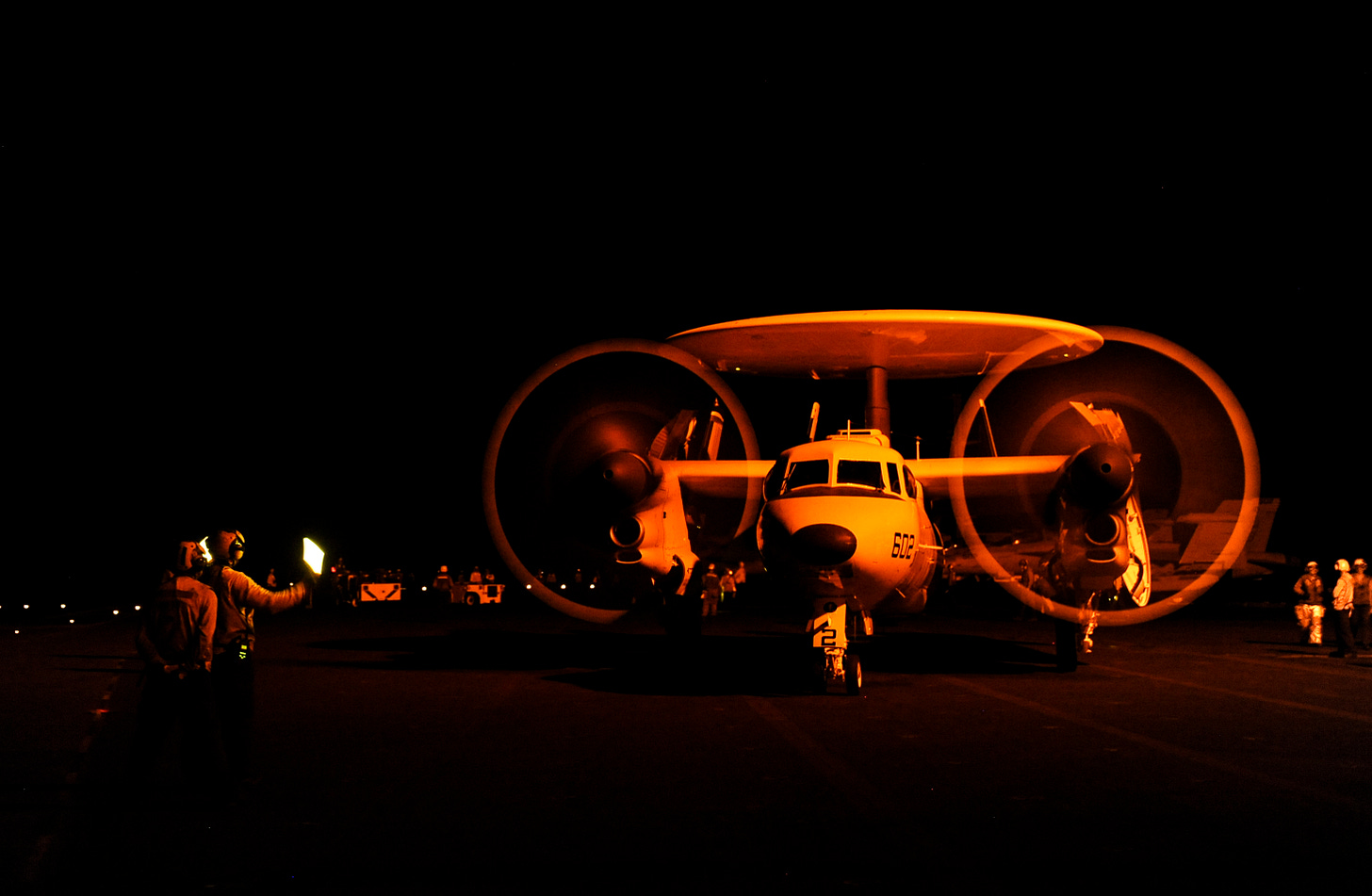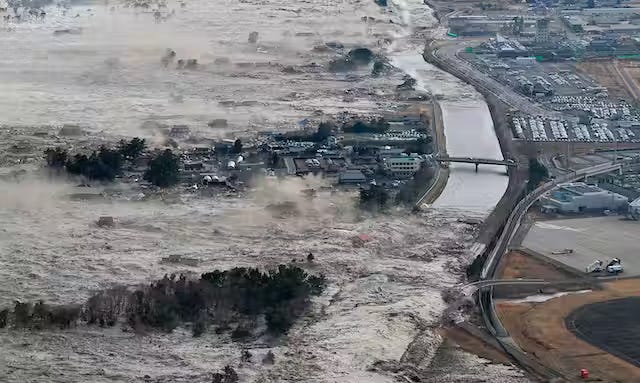Three Hours
Why had god made a night this dark?
Outside of the cockpit, the black night absorbed all light. It gave nothing in return, not even a trace of the horizon. Inside, the dim red instrument light (red light doesn’t overwhelm the rods in your eyes, allowing you to maintain night vision) only hinted at the crucial data those instruments told. Enough to see a pattern, not enough to read anything. Turning my head to look around, the tacky sweat stuck to my neck. This sweat wasn’t from the heat – it was a chilly 55 degrees outside. No, this was from fear. There was nothing worse than night operations on a moonless night, hundreds of miles from land.
Three weeks into deployment our ship was completely alone. There were 5,000 people, 60 airplanes, and no supervision. With no watchful eyes, we were excited to train with our gloves off for the first time. Normally we assume someone is watching, but not out here. These training flights were a rare chance to practice flying and fighting with the latest techniques and the best weapons. To fly like we were in a real fight. Tonight’s flight was unique in that sense. In another sense, it was a routine training flight. Routine or not, the weight of a night takeoff from the boat lingered
A night catapult shot off an aircraft carrier is terrifying. As the catapult shuttle pulls the plane from a dead stop to 135 miles per hour in less than 300 feet, you get hit in the chest with a force 59,000 times stronger than Iron Mike Tyson’s punch. The instantaneous force confuses the fluid in your inner ear, which screams at your brain that you’ve pitched up too hard. Just as you’re tossed into a vacant emptiness, years of training sound the alarm: “ You’re going to stall!”. That thought is scary normally; it’s fatal this low to the ground. Almost every pilot has pushed the nose down, only 60 feet between the ship’s deck and the water. Pilots are drilled to trust your instruments, the little ball 18 inches in front of your face that tells you what your airplane is doing. Trust your instruments when they say you’re not really climbing. Unfortunately, on a night this dark, those instruments were barely illuminated.
The night somehow grew darker as launch time approached. The handler’s flashlights, small yellow wands which were the only indications we were safe and still in control, guided us towards the catapult. As our E-2 Hawkeye taxied to the front of the ship, my nerves grew worse. My voice cracked as I briefed my co-pilot. “Set the alert for 40 feet. If the alert goes off, I’ve lost situational awareness. You need to take the controls and climb. We’ll debrief after.” There was nothing else to say. Any minute now the flashlights outside would signal that we were hooked up to the catapult. We waited. Yet instead of the flashlight signal, the radio crackled to life instead. “All flight operations are canceled. Taxi back and shut down.”
Flights don’t just cancel right before launch.
Before our crew made it through the porthole and into the ship, my boss grabbed me. “Follow me.” We hurried to his stateroom, his private space that doubled as an office and a bedroom, so that we could talk privately. His words came out too fast, trying to tell me something I couldn’t understand. The fluorescent lights blinded. The ship’s noises thundered through the cramped halls. His hurried talking confused me. In that moment, with the world spinning and chills racking my body, I couldn’t take any more. My body stopped.
“Are you okay?”
“No, I don’t know what you’re saying sir. I need a minute.” I leaned against the door of his stateroom, trying to catch my bearings. My stomach was churning as if it had been accelerated to 135 mph without the rest of my body. Bile filled my lungs. I felt like puking.
The focus in his blue eyes softened to a gentle understanding. “Have a seat. Catch your breath.”
30 seconds later, he started again. “About an hour ago, we picked up reports of an earthquake off the coast of Japan. There’s a giant wave traveling to the coast of Japan. It looks big. Our best guess is it will hit the coast of Japan in about five hours, and we don’t know how bad it’s going to be. We’re diverting to provide disaster relief.
As our squadron’s Combat Search and Rescue expert, I need you to head down to the ship’s intelligence center and create a plan. We’ll begin flying first thing in the morning. There are no procedures for this, so you need to figure out what we’re going to do.”
Combat Search and Rescue (CSAR) is exactly what the name implies. When a downed pilot needs rescuing, CSAR is a ballet of strength and firepower, executed to rescue one of our own. In a CSAR, we’re looking for a single person at a precise location before our enemies get them. In disaster relief, we’re looking for any survivors. CSAR is the art of combat, destroying any enemy defenses so we can rescue the pilot. Disaster Relief is a humanitarian mission, more focused on saving lives than fighting. CSAR is Black Hawk Down; disaster relief is Doctors without Borders. In short, not the same thing.
“Sir, I don’t know anything about disaster relief. There has to be someone else who should go instead.”
“Neither does anyone else here. You’re the closest thing we’ve got. Time to put on your big boy pants and figure it out. I trust you. Get down there.”
I was flooded with emotions. Pride that he trusted me. Fear that I would let him down. Excited for the challenge. Humbled by what lay ahead. I turned to walk out the door.
“One more thing. It looks like there’s a second wave headed toward California. We think it should be on shore around 7 am. That’s all we know right now. You should take a minute to call your wife”
Just like that, the conversation was over.
There’s an unbelievable clarity when everything unimportant fades away. All the thoughts and emotions which seemed so important minutes before no longer existed. My next memory was picking up the sole phone in our classified space. What would I say? Nothing sounded right in my head. As I racked my brain, a groggy “hello” broke through the fear.
“Hi love, I’m sorry to wake you. No, I’m okay. Look, there’s been an earthquake in the Pacific and there’s a big wave headed towards California and I need you to do something for me. Go back to sleep, set your alarm early, maybe like 4:30 and when your alarm goes off, get in the car and drive up to Camarillo. Just get away from the shore. I’ll call you when I can. I love you. Bye.”
My stream of consciousness didn’t allow any recognition of the terror I had just inflicted upon my wife.
My mind began to focus on the task at hand. Walking to CVIC (the ship’s intel center), I mentally reviewed what little information we had. The wave was supposed to be 100 feet tall; it ended up reaching 130 feet. It would make landfall at 5:45 am Japan time; six minutes later it was gone. There were six helicopters on the ship that could fly supplies to shore; they weren’t enough for more than one day. And our plane would need to provide air traffic control. That was it.
With the help of two helicopter pilots, a plan formed. The E-2 would launch first. Then four helicopters would take off and fly toward the shore. Each would have a 15-degree sector. They would fly low to the ground looking for survivors. Each helicopter was loaded with as much food, water, medical supplies, and translators as they could carry. When they found someone, they would land, offer supplies, and gather information about other survivors. As they would be too low to the ground to communicate with the ship, the E-2 would act as a radio relay to send that information back so that the next crews knew what to take and where to look. We’d then update our plan before the next helicopters launched. The whole effort would be tracked in an Excel spreadsheet. At the same time, we’d offer the aircraft carrier as a landing pad to any nations that could help. We didn’t have enough pilots to do this alone. Compared to the precise war games we’d spent a year planning, it was nothing. But it had to be enough.
With the plan in place, I needed to get some rest. I would fly the first flight shortly after sunrise. That would be 90 minutes after the tsunami erased cities from the side of the country. Thoughts of what lay ahead filled my head.
Three hours until launch.





Storytelling is a kind of mission in itself, and you completed this one perfectly. I'm struck by that comment from your boss, "I trust you." You've also been entrusted it seems with sharing some remarkable life experiences. It's such a pleasure to watch you deliver them so competently.
Incredible, Latham! This is why I perked up when you mentioned fiction — you have a gift of writing such visceral description. Edge of my seat every time!